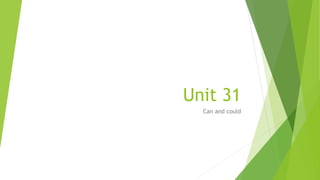Report
Share

More Related Content
What's hot
What's hot (19)
Similar to Unit 31
Similar to Unit 31 (20)
More from Luis Vega
More from Luis Vega (20)
Presentsimplevspresentcontinuousppt 121007170639-phpapp01

Presentsimplevspresentcontinuousppt 121007170639-phpapp01
2405 2 unit_3-simple_progressive_verbs_gerunds_infinitives-1

2405 2 unit_3-simple_progressive_verbs_gerunds_infinitives-1
Presentsimplevspresentcontinuous 110926111722-phpapp02

Presentsimplevspresentcontinuous 110926111722-phpapp02
Recently uploaded
God is a creative God Gen 1:1. All that He created was “good”, could also be translated “beautiful”. God created man in His own image Gen 1:27. Maths helps us discover the beauty that God has created in His world and, in turn, create beautiful designs to serve and enrich the lives of others.
Explore beautiful and ugly buildings. Mathematics helps us create beautiful d...

Explore beautiful and ugly buildings. Mathematics helps us create beautiful d...christianmathematics
Making communications land - Are they received and understood as intended? webinar
Thursday 2 May 2024
A joint webinar created by the APM Enabling Change and APM People Interest Networks, this is the third of our three part series on Making Communications Land.
presented by
Ian Cribbes, Director, IMC&T Ltd
@cribbesheet
The link to the write up page and resources of this webinar:
https://www.apm.org.uk/news/making-communications-land-are-they-received-and-understood-as-intended-webinar/
Content description:
How do we ensure that what we have communicated was received and understood as we intended and how do we course correct if it has not.Making communications land - Are they received and understood as intended? we...

Making communications land - Are they received and understood as intended? we...Association for Project Management
Recently uploaded (20)
Explore beautiful and ugly buildings. Mathematics helps us create beautiful d...

Explore beautiful and ugly buildings. Mathematics helps us create beautiful d...
HMCS Max Bernays Pre-Deployment Brief (May 2024).pptx

HMCS Max Bernays Pre-Deployment Brief (May 2024).pptx
General Principles of Intellectual Property: Concepts of Intellectual Proper...

General Principles of Intellectual Property: Concepts of Intellectual Proper...
Making communications land - Are they received and understood as intended? we...

Making communications land - Are they received and understood as intended? we...
Unit-V; Pricing (Pharma Marketing Management).pptx

Unit-V; Pricing (Pharma Marketing Management).pptx
ICT role in 21st century education and it's challenges.

ICT role in 21st century education and it's challenges.
Vishram Singh - Textbook of Anatomy Upper Limb and Thorax.. Volume 1 (1).pdf

Vishram Singh - Textbook of Anatomy Upper Limb and Thorax.. Volume 1 (1).pdf
On National Teacher Day, meet the 2024-25 Kenan Fellows

On National Teacher Day, meet the 2024-25 Kenan Fellows
Unit 31
- 1. Unit 31 Can and could
- 2. “can” is used to indicate the ability to do something. It is used with a verb in the infinitive form: I can play the piano. Lily can ride a bike. The students can play chess. The teacher can speak Spanish.
- 3. To make a question, switch the order of “can” and its subject: Can you play the piano? Can Bryan ride a bike? Can they play checkers?
- 4. To negate, put “not” between “can” and its verb: “can not”, which is written as one word ==> “cannot” I cannot lift this heavy suitcase. They cannot come because of bad weather. The teacher cannot speak Chinese. Note: Cannot us usually contracted, so we have: I can’t lift this heavy suitcase. They can’t come because of bad weather. The teacher can’t speak Chinese.
- 5. To talk about ability in past. We use could or couldn’t. The neighbors were noisy, so I couldn’t sleep at all last night. James could eat a whole pizza when he was a teenager. They could stay up all night when they were in college.
- 6. Other uses of “ can” :
- 7. Sometimes “can” / “can’t” is used for permission rather than ability: You can’t use your cell phone in the library. Alex can’t come to the party. Lily won’t let him. You can use your cell phones, but only when the teacher says it is OK.
- 8. When asking permission, “could” is a more polite form to use than “can”: Can I have a drink of water? ==> Could I have a drink of water? Could is more polite. Can my friend sit here? ==> Could my friend sit here? Could is more polite. Can you open the window? ==> Could you open the window? Could is more polite.
- 9. Now, practice! Go to www.teacherluisvega.com Beg. Grammar Can and Could Practice.
